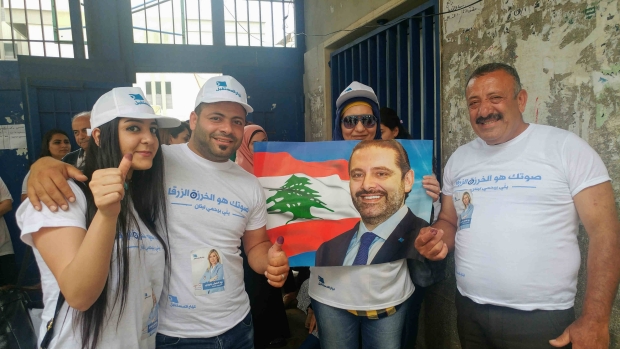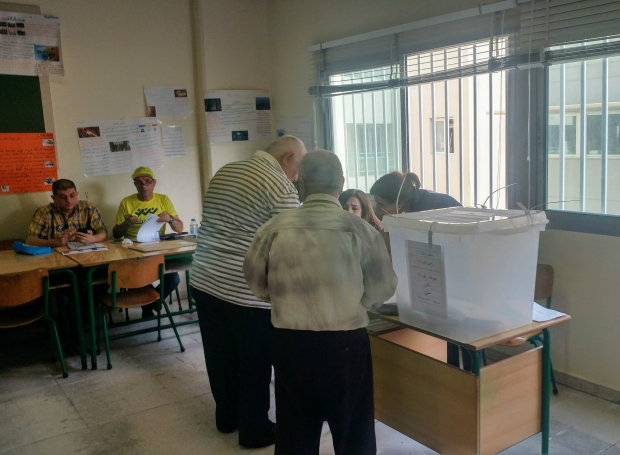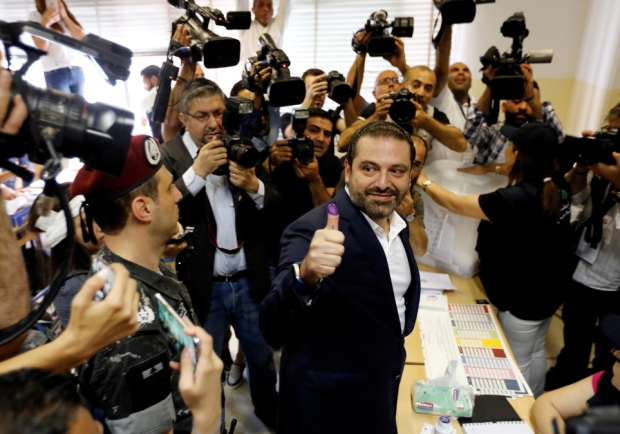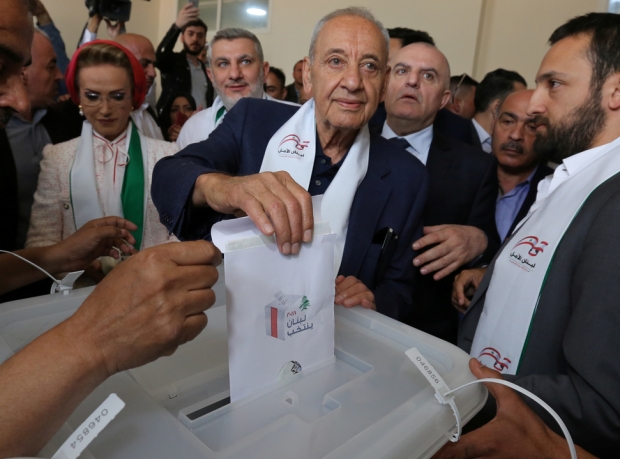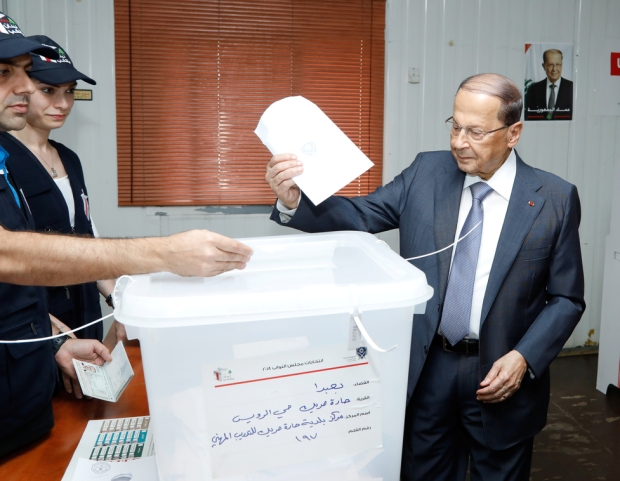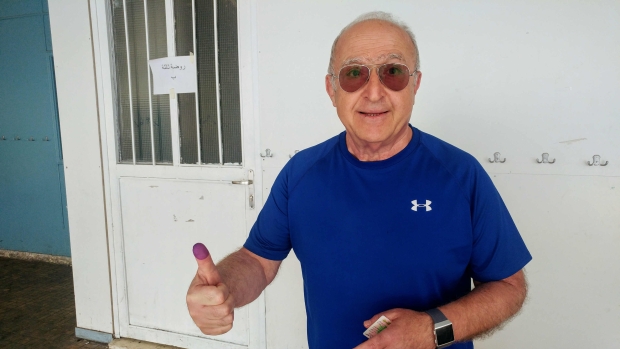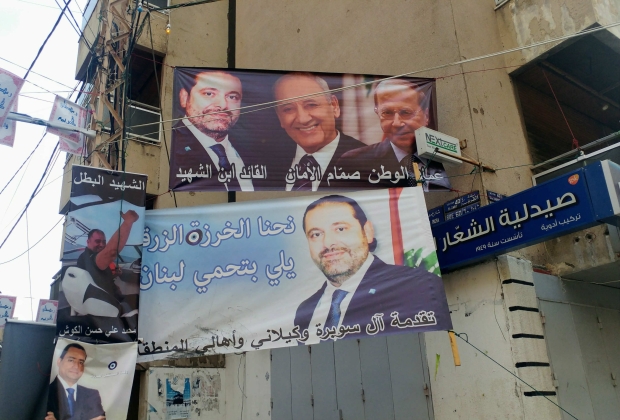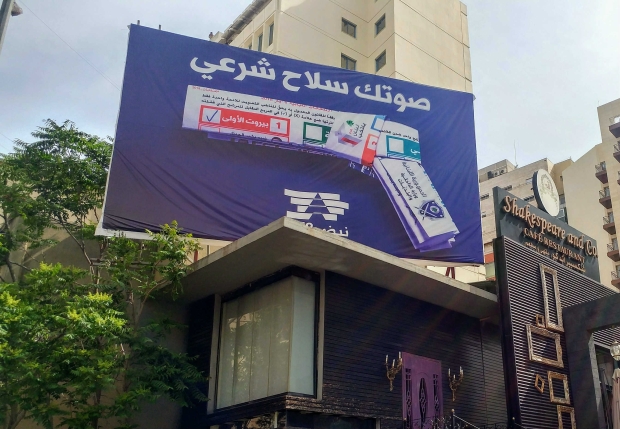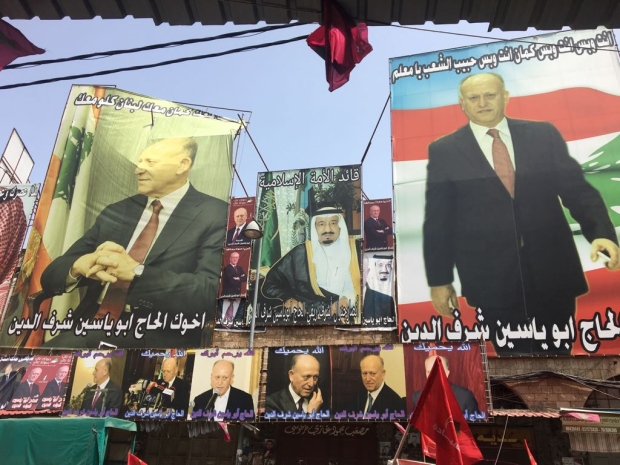LIVE: Lebanon holds first parliamentary election since 2009
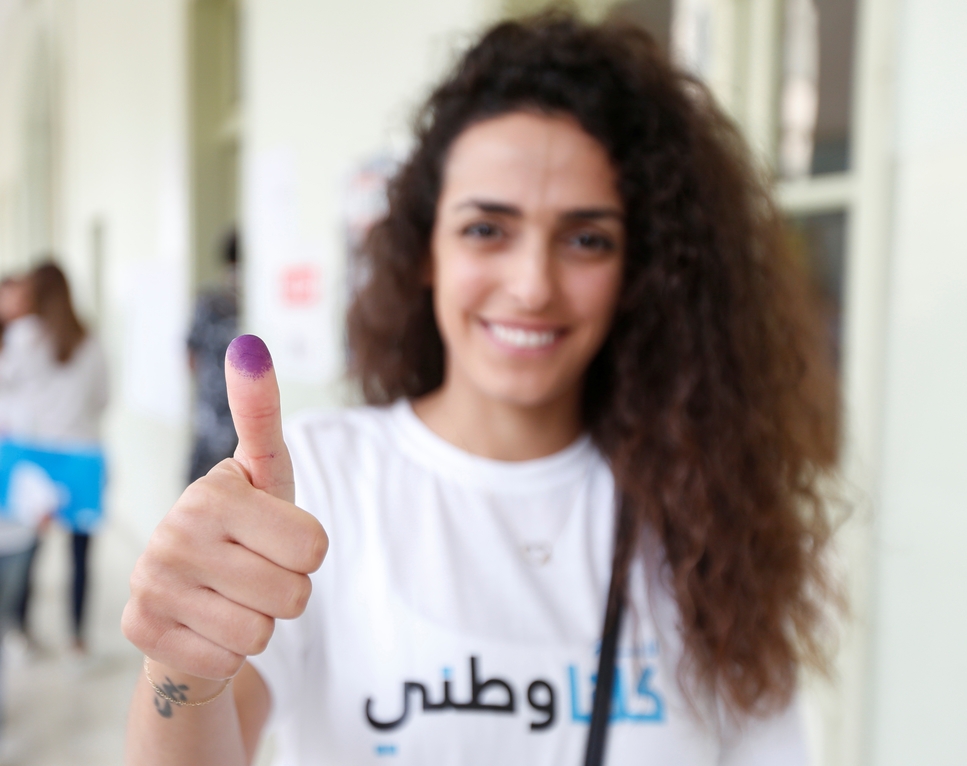
Lebanon heads to the polls for the first time in nine years to vote in Sunday's parliamentary elections.
From the Syrian civil war sending shockwaves through its diminutive neighbour to the temporary resignation of Prime Minister Saad Hariri in Riyadh, a lot has happened in Lebanon since the last general election and much has changed.
Our man on the ground, Ali Harb, will be driving across Beirut, speaking to voters and bringing you all the colour of polling day, with Chloe Domat doing the same up in the north's Tripoli.
Feel free to leave comments and news tips below on Twitter @MiddleEastEye and Facebook.
Photo: A woman shows her ink-stained finger after casting her vote during the parliamentary election in Beirut, Lebanon, (Reuters)
Live Updates
In an attempt to attract younger voters, Prime Minister Saad Hariri has used selfies as a campaign tactic.
Besides regularly posing for selfies with supporters, last week he promised a crowd of woman he would take photos with all 6,000 of them if he wins in the elections.
The message has clearly registered with voters. In Beirut's Al-Tariq al-Jdideh neighbourhood, supporters are blasting a song that goes: "We will take a selfie with you and pray to God to back you."
A group of Future Movement volunteers cheerfully told MEE that they will be taking selfies with the prime minister while celebrating the results tonight.
"They all want to fight Sheikh Saad," Hariri supporter Nader Tabara said of the prime minister's competitors. "But they won't get anywhere. He's the only leader of Sunnis."
In Christian east Beirut, the streets are significantly less crowded than usual. Residents who hail from Mount Lebanon and the north have had to head to their home villages to participate in the elections.
At one precinct in Ashrafieh, observers from Kollouna Watani list of independents were complaining that they were not given the necessary permits to enter the polling station. They said their absence opens the door to cheating against their candidates.
"We are sick and tired and disgusted," Diana Abu Slaiman, a volunteer with Kollouna Watani told MEE. "We are demanding change for our children."
Independents hailing from Lebanese civil society are desperate to make an impact in these elections, after Beirut Madinati's near miss in 2016's municipal elections. Read more here...
Polling stations, mostly at public schools, are separated into different areas for genders and religious sects.
While in the past voters brought their own ballots (lists of names that can be handwritten), only the interior ministry is responsible for handling ballots in this election. Slates are marked by different colours with photos of candidates on each list.
Before leaving, voters are required to dip their thumbs in an ink container. In theory, the ink marks that they have voted, so they can't vote again. But it's more of a symbolic gesture.
The new process did not seem to faze voters, several of whom described the operation as good if not "excellent."
In the Shia-majority Msaitbeh neighbourhood of Beirut, Hezbollah seemed to dominate the vote. "We voted to renew our allegiance to the Resistance," a middle-aged woman told MEE's Ali Harb, referring to Hezbollah.
Rania Zakzouk, 27, said that as a first-time voter she finally feels like a fully functioning member of society. "It's important to participate and make our voices heard," she told MEE.
In some areas of west Beirut, Hariri's Future Movement appears to be the strongest force on the ground, but other factions are also visibly present, including campaigners for billionaire businessman Fouad Makhzoumi.
"Change" is a recurring theme with voters who have spoken to MEE.
Yehya Shouman, an aluminum trader, spoke of unseating the entire parliament.
"We want to change all 128 of them, and more if possible," he told MEE.
Analysts are expecting Hezbollah to come out top in this election. While its main rival, the future movement, are hoping to mitigate its losses.
In east Beirut's Ashrafieh neighbourhood, the Christian Kataeb party has targeted the Shia "Party of God" with this poster, its slogan, "Your vote is a legitimate weapon," is a clear dig at Hezbollah's military wing.
Success in these elections will cement Hezbollah's role as part of the Lebanese state, which could lead to further tensions with its enemy to the south, Israel. In March MEE travelled to the Lebanese-Israeli border to investigate the looming threat of war. Read more here...
Contrary to other parts of the country, no political group has a clear upper hand in Tripoli, Lebanon’s second-largest city.
Today, eight lists are competing for 11 seats. What is at stake? Lebanon’s Sunni leadership. Home to 350,000 people, Tripoli is the biggest Sunni city, and for politicians, notably those who seek to become prime minister (a seat reserved for Sunnis), it is essential to have support there.
Today, the battle will be fierce between the country’s four Sunni giants: Prime Minister Saad Hariri, who isn’t running personally but is represented through a Future Movement list; ex-premier Najib Mikati, running to renew his mandate; former justice minister Achraf Rifi, who emerged during the 2016 municipal elections; and Faisal Karame, who belongs to a famous political dynasty. Joining them in the race are two civil society lists and an Islamist one.
The streets are very calm compared with usual. There is a strong army presence, lots of military vehicles on patrol and soldiers on foot. The city is covered in posters for the elections. The big four are the most visible, but newcomers are also showing their faces.
Mohammad Nachar, owner of a glass factory in Tripoli, said he will vote for the Hariri-backed list.
"I will vote for him because for a long time he has been helping us. When we need to go to the hospital, to find a job, when someone is in jail ... Hariri found jobs for my family," he told Chloe Domat.
"For now people are not voting much, they are waiting to receive some money. After 4pm, people will receive calls offering money for votes and they will go. Not everyone is like this of course, but here in Tripoli there is a lot of poverty, so if someone offers $100 cash why not vote for him?"
Hello and welcome to Lebanese election day!
It’s been a long time coming – nine years in fact – thanks to MPs postponing parliamentary elections on three separate occasions, in 2013, 2014 and 2017, citing security issues and problems with the electoral law.
Well today the flames of the Syrian war have receded from Lebanon’s borders somewhat and a new, bafflingly complicated electoral law has been bashed out, meaning Lebanese can once again exercise their democratic right.
It has been a fraught campaign, with rhetoric and tension ratcheting up as polling day approached. On Friday, Prime Minister Saad Hariri, who leads the broadly Sunni, Saudi Arabia-aligned Future Movement, implored Beirutis not to vote for those accused of assassinating his father, Rafic Hariri.
By this, of course, he means Hezbollah, with which he is competing in the key Beirut 2 district, and which looks set to do very well in these elections alongside its allies.
This doesn’t spell well for Hariri, however, who has suffered a series of embarrassments, challenges and financial issues in recent years, most noticeably his seemingly forced resignation in Saudi Arabia that he quickly rowed back on once he was back on Lebanese soil.
Elsewhere, the two largest Christian parties, President Michel Aoun’s Free Patriotic Movement and the former militia leader Samir Geagea’s Lebanese Forces, have been facing off as well.
Foreign Minister Gebran Bassil, who just so happens to be Aoun’s son-in-law and head of the FPM, spent Friday rejecting LF claims his party’s ministers were corrupt, accusing his rivals of being “electorally corrupt” instead.
But with the enforced media blackout that began at midnight on Friday the noise across the country receded, finally leaving Lebanese time on Saturday to reflect and think – who am I going to vote for?
They will be choosing among 583 candidates, who are split up across 77 electoral lists, to fill the Lebanese parliament’s 128 seats.
With the power to elect presidents, write laws and sign treaties, the parliament is a key institution. Who will emerge with the power to guide it?
Middle East Eye will be here all day as the Lebanese make this decision, with constant updates from the ground and the virtual world of social media.
Middle East Eye's Ali Harb is in Beirut, where many are voting for the first time. Lebanese who became eligible to vote just after the last elections have now had to wait until they are 30 years old in order to choose their MPs.


